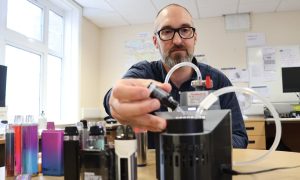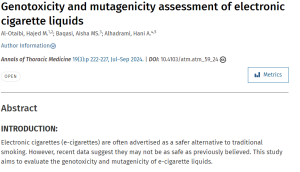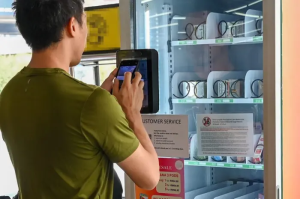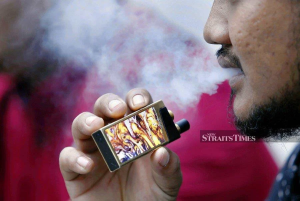Health experts denounce the recent marketing tactics of vape companies, especially after liquid nicotine was declassified, calling it an unethical and irresponsible attempt to normalise vaping among children and teens.
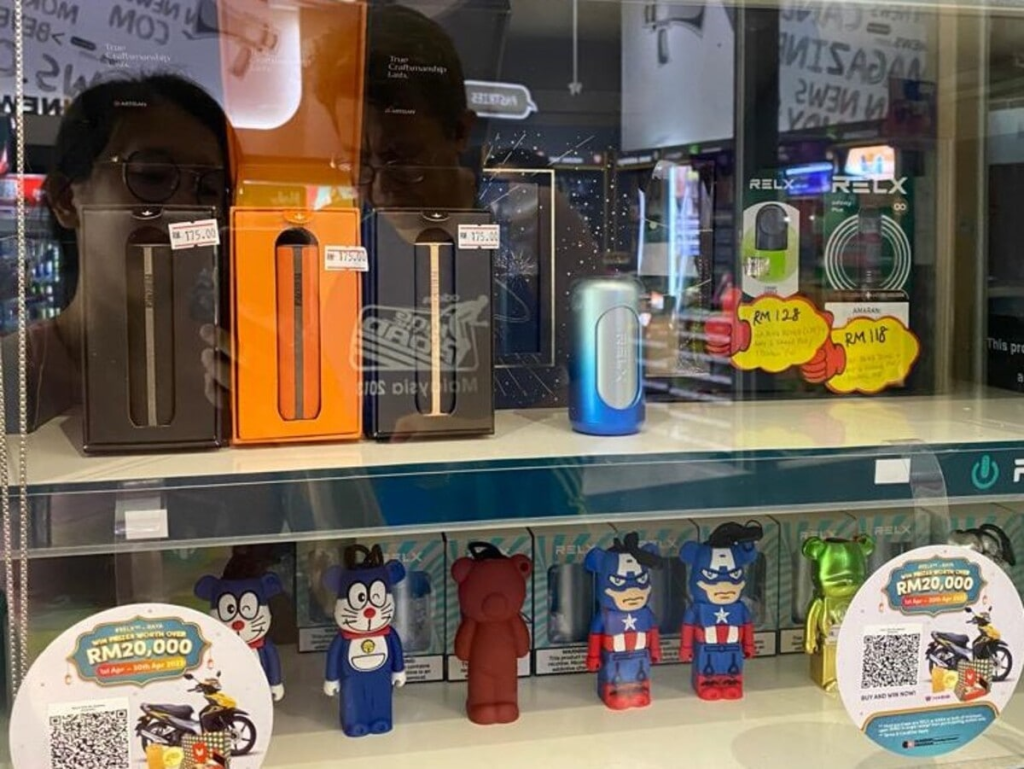
KUALA LUMPUR, May 5 – Many companies advertise their brands on duit raya packets, a common tradition during festive seasons, especially Hari Raya celebrations, in Malaysia.
While it may seem harmless, promoting certain brands, like vape products, through this method could have unintended consequences, particularly when the recipients of these packets are mostly children and teenagers.
Dr. Amer Siddiq Amer Nordin, a consultant psychiatrist and smoking cessation specialist at the University of Malaya, recently took to Twitter to share a photo of a jet-black duit raya packet featuring a grid of multi-colored rechargeable disposable pods. These pods are a type of vape that uses a battery and a ‘pod’ instead of a tank and claim to offer 10,000 puffs per pod.
Vape sellers are also actively promoting their products on TikTok, a social media platform where 41 percent of users in Malaysia are between 16 and 24 years of age, offering Hari Raya deals and vibrantly colored limited edition vape devices. Some sellers are even demonstrating how many vape products a person can buy for as low as RM5.
It is clear that vape sellers are targeting a younger demographic, whether they acknowledge it or not. The growing number of young students using vape products in schools is a clear indication that their message is resonating with this particular group of consumers.
According to Fahmi Hassan, a former chief assistant director at the Ministry of Health’s (MOH) Pharmacy Services Programme, children in his neighborhood were riding their bicycles and vaping while making their Hari Raya visits. Fahmi said the children would stop vaping before they entered a house for a visit and would resume vaping once they left.
“This is my observation. I saw kids vaping on their bicycles while going around the neighborhood for Hari Raya visits. The children stopped vaping before entering the house and resumed vaping after leaving,” the pharmacist told CodeBlue when contacted.
Fahmi said he noticed a contrast in vaping and smoking trends among young people. Unlike smoking, where teenagers would discreetly smoke one or two cigarettes in secluded spaces, minors are now chain vaping in public with little hesitation.
“Yes, kids smoked back then. But they smoke in secluded places or when they think nobody is looking at them. And they smoke one or two ciggies at a time. With vaping, they are chain vaping. We are seeing a different generation of nicotine addicts,” Fahmi said.
“A lot of my relatives are teachers. According to them, vaping is very rampant among students. It’s uncontrollable. There are always kids vaping in the toilet, and students will vape openly immediately after going out of the school compound,” Fahmi said.
“It really is a pandemic.”
The absence of legal restrictions or penalties for vape sellers causing harm in Malaysia is particularly worrisome, especially after the delisting of liquid and gel nicotine from the Poisons Act 1952 – the country’s sole regulation to protect the public from this highly addictive substance.
When asked about what he thought of the vape industry’s advertising tactics which seemed to target young children and teenagers, Fahmi said he found the whole affair unethical and disheartening as no action can be taken against these companies due to the delisting of liquid and gel nicotine that puts the vape industry on the right side of the law.
“I think this is very unethical. It’s very sad that no action can be taken against them since currently there is no regulation that is applicable to selling and promoting vaping products – even to children.
“This proves that vape should be regulated as strictly as cigarettes. Being lenient to them sends the wrong message. It would seem that the government is commercializing vape and sees that the industry is important for the country’s economic growth,” Fahmi said.
“We would just be repeating the same mistake that we made with cigarettes.”
In the 1960s and 1970s, cigarette advertising in Malaysia was rampant, including direct ads on TV and indirect promotion through brand names like the infamous Camel Boots ads in Norway.
However, Malaysia has come a long way since then, implementing strict regulations that virtually ban all tobacco advertising and require cigarette packaging to display prominent health warnings.
Despite this progress, the country’s regulations do not apply to liquid and gel nicotine, leading to a new surge in advertising and marketing for these products.
On social media platforms, e-cigarette sellers and companies have run a gauntlet of raya ad campaigns, marketing raya vape pens, duit raya packets, and special Raya promotions.
While these advertisements have recently come under scrutiny, they have been running for years. In 2021, a vape company released an e-liquid that claimed to taste like kuih raya, a traditional Malaysian festive delicacy, while in 2020, another vape company tweeted a poster wishing everyone a Selamat Hari Raya while showcasing their numerous accolades.
Similarly, during the Chinese New Year celebrations in 2023, some vape shops offered Lunar Vape deals.
Despite the fact that e-cigarette advertising on social media platforms has been ongoing for some time, there is now an increasing concern among the public that these ads are becoming more aggressive, appearing in public spaces on a larger scale, and potentially influencing minors.
Dr. Mohd Afiq Mohd Nor, President of IKRAM Health Malaysia, expressed concern that the vape industry is deliberately targeting young children by using duit raya as a vehicle for advertisement.
The emergency physician at University Malaya Medical Centre (UMMC) described this as an irresponsible tactic by the vape industry that is intended to normalize vaping among young people.
“Why would they want to advertise vape products on the sampul raya when they are aware of who the majority of Duit Raya recipients are? It is obvious that they are targeting young children.
“The vaping industry is acting very irresponsibly by attempting to normalise the practice and make it seem beneficial and widespread,” Dr Mohd Afiq said. “Are they in too much of a bind because a growing number of people oppose the sale of e-cigarettes to minors and support the GEG (Generation End Game) bill?”
Earlier in April, vape industry leaders pledged to “self-regulate” after a stakeholder meeting with Deputy Health Minister Lukanisman Awang Sauni. Adzwan Ab Manas, president of the Malaysia Retail Electronic Cigarette Association (MRECA), in a Facebook post, reminded industry players not to exploit the absence of regulation and refrain from selling e-cigarette products to those under the age of 18.
Although leaders in the vape industry have made a pledge to self-regulate their products, Dr. Mohd Afiq, like Fahmi, expressed concern over the state of smoking, particularly among secondary school boys who are seen vaping outside the school compound near convenience stores before and after school. Dr. Mohd Afiq also shared that his family, including his parents, aunts, and uncles, share these concerns.
“Parents, pakcik, makcik as well as those who smoke and vape, have expressed concern about the current state of vaping use among teenagers and schoolboys, mostly secondary school age, especially since there is no law in place to regulate the sale of the substance once it is legalized.
“Many points the finger at the industry and vape retailers who are not at fault for catering to this teen group. Others blame parents and relatives for not keeping an eye on their kids’ activities.”
Health Minister Dr. Zaliha Mustafa plans to table the “new” Control of Smoking Product for Public Health Bill 2023 and pass it into law in the upcoming parliamentary meeting which will only last 11 days. The bill retains the GEG provision that seeks to ban tobacco and vape products for anyone born from January 1, 2007.
Source: Code Blue

